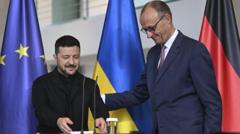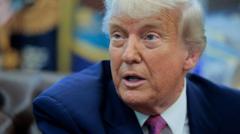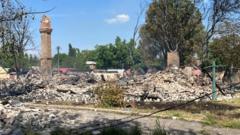In a significant shift in policy, German Chancellor Friedrich Merz has committed to supporting Ukraine in producing long-range missiles, aiming to bolster its defenses against ongoing Russian attacks.
Germany Solidifies Support for Ukraine with Long-Range Missile Production Deal

Germany Solidifies Support for Ukraine with Long-Range Missile Production Deal
Friedrich Merz pledges military assistance to enhance Ukraine's defense capabilities against Russian aggression.
Germany's newly appointed Chancellor Friedrich Merz has made headlines after announcing critical military support for Ukraine during a recent meeting with President Volodymyr Zelensky in Berlin. Merz stated that Germany would assist in the production of long-range missiles to enhance Ukraine's defense capabilities amidst continued hostilities from Russia.
Merz, who took office earlier this month, has vowed to increase German aid to Ukraine, signaling a departure from the previous administration's approach. He confirmed that Germany would not impose range limitations on the weaponry supplied to Ukrainian forces. While details regarding specific munitions remain undisclosed, Merz hinted that a "memorandum of understanding" regarding long-range missile cooperation would be finalized by the respective defense ministers.
The decision comes in response to persistent Russian assaults, and Ukrainian forces are reportedly facing intensified attacks in the northeastern regions. Progress in diplomatic talks has been slow, and Zelensky has accused Moscow of hindering peace negotiations. Despite this, Russian Foreign Minister Sergei Lavrov recently indicated Moscow's willingness to hold further discussions, suggesting a second round of peace talks could take place soon.
As the war enters its fourth year, both nations continue to endure significant losses, with Ukraine's eastern and southern territories sustaining heavy damage and casualties. With the stakes higher than ever, Zelensky's appeals for continued support from Western allies underscore the urgency of the situation amid escalating violence and geopolitical tensions in the region.
Merz, who took office earlier this month, has vowed to increase German aid to Ukraine, signaling a departure from the previous administration's approach. He confirmed that Germany would not impose range limitations on the weaponry supplied to Ukrainian forces. While details regarding specific munitions remain undisclosed, Merz hinted that a "memorandum of understanding" regarding long-range missile cooperation would be finalized by the respective defense ministers.
The decision comes in response to persistent Russian assaults, and Ukrainian forces are reportedly facing intensified attacks in the northeastern regions. Progress in diplomatic talks has been slow, and Zelensky has accused Moscow of hindering peace negotiations. Despite this, Russian Foreign Minister Sergei Lavrov recently indicated Moscow's willingness to hold further discussions, suggesting a second round of peace talks could take place soon.
As the war enters its fourth year, both nations continue to endure significant losses, with Ukraine's eastern and southern territories sustaining heavy damage and casualties. With the stakes higher than ever, Zelensky's appeals for continued support from Western allies underscore the urgency of the situation amid escalating violence and geopolitical tensions in the region.




















